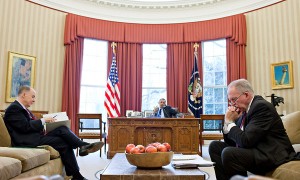Angler 2.0: Brennan Wields His Puppet Strings Differently
 As I said earlier, the parallel between the Jo Becker/Scott Shane Angler 2.0 story and the earlier series by Becker and Barton Gellman is hard to miss.
As I said earlier, the parallel between the Jo Becker/Scott Shane Angler 2.0 story and the earlier series by Becker and Barton Gellman is hard to miss.
But I’m very interested in how the stories are structured differently. With Angler 1.0, the story was very clearly about Dick Cheney and the methods he used to manipulate Bush into following his advice. Here, the story is really about John Brennan, Obama’s Cheney, portrayed deep in thought and foregrounding Obama in the article’s picture. Indeed, halfway through, the story even gives biographical background on Brennan, the classic “son of Irish immigrants” story, along with Harold Koh’s dubious endorsement of Brennan’s “moral rectitude.”
But instead of telling the story of John Brennan, Obama’s Cheney, the story pitches Obama as the key decision-maker–a storyline Brennan has always been one of the most aggressive pitchmen for, including when he confirmed information on the Anwar al-Awlaki strike he shouldn’t have. In a sense, then, Brennan has done Cheney one better: seed a story of his own power, but sell it as a sign of the President’s steeliness.
The Silent Sources for the Story
I already pointed out how, after presenting unambiguous evidence of Brennan’s past on-the-record lies, the story backed off calling him on it.
But there are other ways in which this story shifts the focus away from Brennan.
A remarkable number of the sources for the story spoke on the record: Tom Donilon, Cameron Munter, Dennis Blair, Bill Daley, Jeh Johnson, Michael Hayden, Jim Jones, Harold Koh, Eric Holder, Michael Leiter, John Rizzo, and John Bellinger. But it’s not until roughly the 3,450th word of a 6,000 word article that Brennan is first quoted–and that’s to largely repeat the pre-emptive lies of his drone speech from last month.
“The purpose of these actions is to mitigate threats to U.S. persons’ lives,” Mr. Brennan said in an interview. “It is the option of last recourse. So the president, and I think all of us here, don’t like the fact that people have to die. And so he wants to make sure that we go through a rigorous checklist: The infeasibility of capture, the certainty of the intelligence base, the imminence of the threat, all of these things.”
That is the only on-the-record direct quote from Brennan in the entire article, in spite of the centrality of Brennan to the story.
And I would bet several of the sources quoted anonymously in the section describing Obama’s method of counting the dead (which still ignores the women and children) are Brennan: “a top White House adviser” describing how sharp Obama was in the face of the first civilian casualties; “a senior administration official” claiming, in the face of credible evidence to the contrary, that the number of civilians killed in drone strikes in Pakistan were in “single digits.”
Note, too, the reference to a memo his campaign national security advisors wrote him.
“Pragmatism over ideology,” his campaign national security team had advised in a memo in March 2008. It was counsel that only reinforced the president’s instincts.
The memo was written not long after Brennan started playing a more central role among Obama’s campaign advisors. But the story makes no mention of his presumed role in it. Further, in describing Jeh Johnson to introduce a quote, the piece notes that he was “a campaign adviser” (it doesn’t say Johnson was also focused on voter protection). But it does not note that Brennan, too, was a key campaign advisor, one with an exclusively national security focus.
Nor does the story note, when it describes how Obama “deployed his legal skills … to preserve trials in civilian courts” it was John Brennan making that case, not the Attorney General.
In other words, in several places in this story, Brennan plays a key role that is downplayed.
The Pro-Drone Narrator
Given that fact, I’m really interested in the several places where the story adopts a pro-drone viewpoint (it does adopt a more critical stance in the narrative voice at the end).
For example, the story claims, in the first part of the story, that the drone strikes “have eviscerated Al Qaeda” without presenting any basis for that claim. This, in spite of the fact that al Qaeda has expanded in Yemen since we’ve started hitting it with drones.
Later, the article uncritically accepts the claim that the drone–regardless of the targeting that goes into using it–is a “precision weapon” that constitutes a rejection of a “false choice between our safety and our ideals.”
The care that Mr. Obama and his counterterrorism chief take in choosing targets, and their reliance on a precision weapon, the drone, reflect his pledge at the outset of his presidency to reject what he called the Bush administration’s “false choice between our safety and our ideals.”
For fucks sake! This article describes how the White House has adopted a “guilt by association” approach to drone targeting. Read more →
